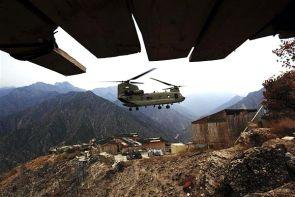 | « Back to article | Print this article |
 For more than a decade, wads of American dollars packed into suitcases, backpacks and, on occasion, plastic shopping bags have been dropped off every month or so at the offices of Afghanistan's president -- courtesy of the CIA, a media report on Monday said.
For more than a decade, wads of American dollars packed into suitcases, backpacks and, on occasion, plastic shopping bags have been dropped off every month or so at the offices of Afghanistan's president -- courtesy of the CIA, a media report on Monday said.
All told, tens of millions of dollars have flowed from the CIA to the office of President Hamid Karzai, according to current and former advisers to the Afghan leader.
"We called it 'ghost money'," said Khalil Roman, who served as Karzai's deputy chief of staff from 2002 until 2005. "It came in secret, and it left in secret", the New York Times quoted him as saying.
The CIA, which declined to comment for this article, has long been known to support some relatives and close aides of Karzai, it said adding that the new accounts of off-the-books cash delivered directly to his office show payments on a vaster scale, and with a far greater impact on everyday governing.
The US was not alone in delivering cash to the president. Karzai acknowledged a few years ago that Iran regularly gave bags of cash to one of his top aides, the report said.
"At the time, in 2010, American officials jumped on the payments as evidence of an aggressive Iranian campaign to buy influence and poison Afghanistan's relations with the United States. What they did not say was that the CIA was also plying the presidential palace with cash -- and unlike the Iranians, it still is," the NYT said.
Payments ordinarily range from hundreds of thousands to millions of dollars, the officials said, though none could provide exact figures.
The money is used to cover a slew of off-the-books expenses, like paying off lawmakers or underwriting delicate diplomatic trips or informal negotiations, the report said.